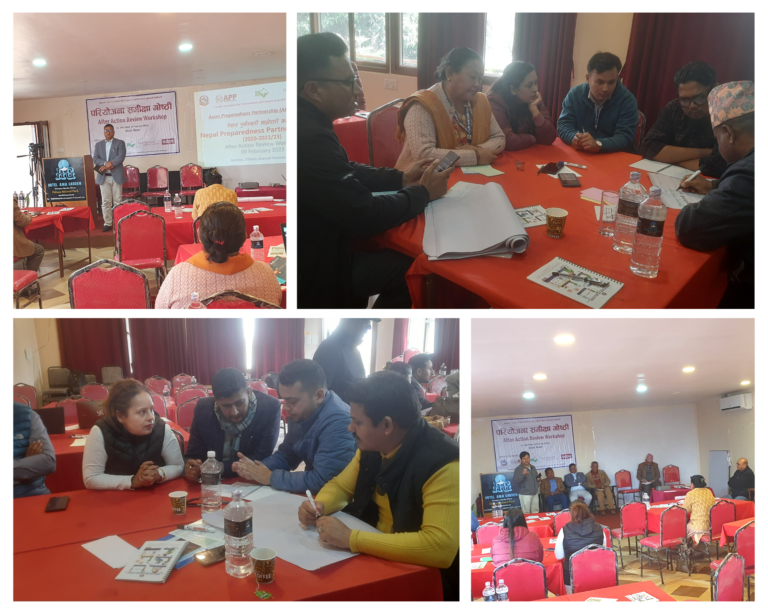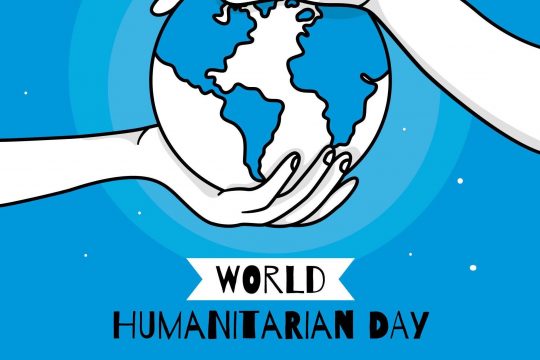The after-action review on ‘‘Increased locally led actions to prepare for, respond to, and recover from disasters in Nepal’’ under Nepal Preparedness Partnership (NPP) was carried out by organizing a one-day event on 09 February 2023 in Sauraha, Chitwan, Bagmati Province of Nepal. The program was designed with the aim to share and document experiences and lessons learned, priorities, and strategic actions for future initiatives. The program was organized by the Ministry of Home Affairs (MOHA); Nepal Preparedness Partnership (NPP); the Asian Disaster Preparedness Center (ADPC)-Asian Preparedness Partnership (APP); and Bill & Melinda Gates Foundation (the foundation). A total of 28 participants (7 Female, 21 Male) including the, Mayor, Deputy-Mayor, Chief Administrative Officers, Ward Chairpersons, elected members, DRR focal persons, heads of women, children, and senior citizen sections of NPP working municipalities of Chitwan district participated in the program.
The program was designed with more participatory approaches, including group work, open discussion, and sharing. Three groups were formed to discuss a) key achievements/progress/changes that the NPP adhered to in comparison to the pre-project scenario; b) the key bottlenecks/challenges/constraints that were faced in achieving the progress or changes and measure to resolve those challenges; c) additional actions/activities needed (based on the learnings of this phase of NPP) and way forward for a similar partnership with other development partners in the immediate future.

Summary of the discussion:
- Appropriate media mobilization and IEC material and dissemination facilitated behavior change of the local people/stakeholders on risk reduction initiatives.
- Capacitated frontline local humanitarian workers, newly elected municipal members, and municipality staff on DRRM and Humanitarian Standards supported to strengthen the operational capacity of the municipality.
- The engagement and leadership of the local government and community participation during the Local Disaster and Climate Resilience Plan (LDCRP)/ Disaster Preparedness and Response Plan (DPRP) process have increased local-level ownership for its smooth implementation.
- Inadequate coordination among federal, provincial, and local governments has made Disaster management more challenging, unsystematic, and weak. Effective awareness-raising on guidelines and regulations is thus continuously needed to respond to current and emerging situations.
- The rural/municipalities are facing resource (human and financial) constraints in establishing emergency operation centers and upgrading the technical skills and knowledge of their DRM personnel.
- Local-level investment in capacity building, emergency preparedness and response, and disaster risk reduction and management systems to build resilience, needs to be prioritized.
Learning:
- Proper coordination among stakeholders can address budgetary constraints and develop local working synergy among local stakeholders to support the local disaster situation.
- Continuous coordination, consultation, and collaboration with local authorities and stakeholders to develop local ownership is necessary.
- The development of an appropriate communication channel for effective coordination with local government, LHOs, private sectors, academia, and non-government agencies is necessary for collaboration.
- As the local levels are mandated to manage local disasters, prioritization, and investments are necessary to strengthen the local disaster management system including risk reduction, preparedness, and response.
- Knowledge building is the cornerstone for confidence building and changes in perception among the multiple stakeholders for disaster resilience building. Thus, capacity-building initiatives need to be facilitated with appropriate and simplified tools and methodologies to streamline learning and understanding.
Way forward:
- Establish and strengthen local emergency operation centers for effective and timely disaster management.
- Improve public awareness of DRRM to ensure community engagement and mobilization in preparedness and response.
- Provide training/orientation to local government officials, front-line workers, humanitarian organizations, and private sectors in DRRM, Humanitarian Standards, and Sphere standards for effective disaster management.
- Enhance the capacity of local government in participatory planning and management for mainstreaming disaster risk reduction and management.
- Re-vitalize and strengthen existing structures or platforms for coordination, partnership, and harmonization.
- Create an enabling environment for effective engagement of CSOs, private sectors, and academia.
Mr. Shashi Kumar Khaniya, Mayor, Khairahani Municipality
“It is the responsibility of the local government to save the people and properties from disasters in the municipality. With this responsibility, we are gradually improving the disaster risk reduction and management works in the municipality. The municipal team has become more knowledgeable and better equipped for disaster management through the various capacity-building programs and LDCRP and DPRP formulation and basic life-saving equipment support provided by NPP in collaboration and coordination with the municipality. I would like to express my gratitude to NPP for their dedicated support and request for the continuation of support in the field of disaster management.”
Mr. Yadav Prasad Pathak, Deputy Mayor Ratnanagar Municipality
“Through the support from NPP, we are gradually institutionalizing disaster management work in the municipality. We have upgraded our understanding of disaster management through collaborative programs based on the MoU between the Municipality and NPP. The collaboration with NPP has contributed to capacity building, policy and planning formulation, and response capacity, for which I would like to thank NPP. In addition, there is still more to be done, including the establishment of local emergency operation centers in the municipalities, for which I expect similar collaboration in the future.”
Ms. Samita Dallakoti, Ward Chairperson/ Forest, Environment/Disaster Management Committee Rapti Municipality
“Previously, we had been preoccupied with the responsive aspects of our disaster risk reduction and management activities and unaware that, so many had already been developed. NPP has provided us the opportunity to learn about the acts, laws, policies, regulations, and guidelines on inclusiveness and rights-based approaches in disaster management, through orientations and training, which we feel will enable us to apply and replicate. The NPP has capacitated us to institutionalize and mainstream the DRRM works through the developed LDCRP and DPRP. I thank NPP for their support to make the municipality disaster resilient and expect its future continuity.”


